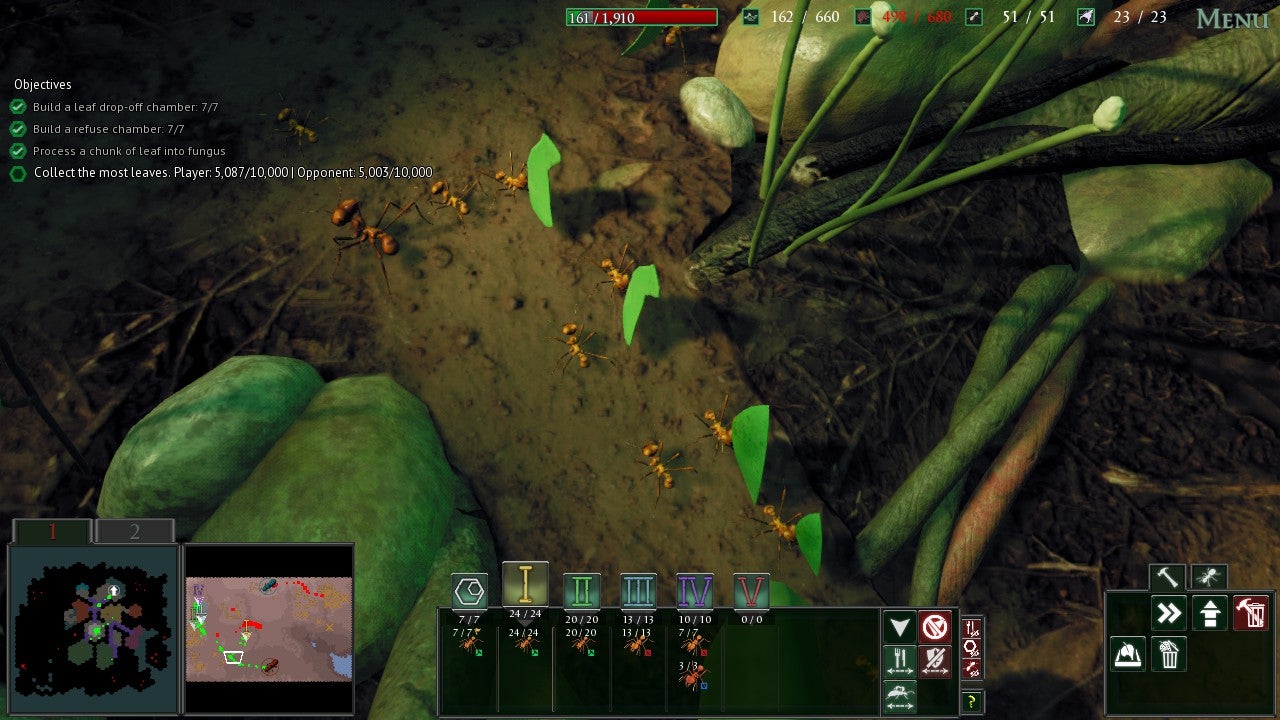Rally Point: The ants are willing to die for me in Empires Of The Undergrowth

My first memory is of ants. Just ants. It's one of those very early ones that are nothing but a momentary snapshot now, long since worn with use and subconsciously filled in with probably inaccurate details and context. They were moving around on a white doorframe, and I don't remember the surroundings, or what I was doing, what I did with this observation, or whether anyone even told me what ants are or whether I already knew. But I remember a fascination that never left me. I will, as ever, die for them. To be fair, I'd die for basically anyone who is a cool animal and/or passably feigns friendship, but whatever. The point is: ants.
You'd think I would have played Empires Of The Undergrowth sooner.
I meant to! For years! Being Ants is one of those dream game concepts, and an incredibly difficult one to translate to a workable, satisfying design that isn't hyper simplified or a glorified reskin. And Slug Disco have kind of gone ahead and done it.
EOTU's first quirk is that it doesn't quite fit an obvious model. It's some sort of cousin to Dungeon Keeper, placing you underground and tagging tiles for workers to dig out instead of building, then spending food to turn the exposed hexes into a nursery or food storage. Workers will then bring stored food to the tile, creating a larva that will either pop open into a fresh ant, or sit there indefinitely, waiting for an existing adult to die so it can replace them, much like human children.
Image credit: RPS / Slug DiscoYou don't build or train your ants directly. Nor is there the traditional square-dragging and ctrl+ business; five set control groups are available (plus one for ants you want to stay home, digging and replacing larvae), direct control of which is limited to a single "go here" command and a couple of toggles - ignore combat and ignore food, without which the group will opportunistically attack or grab any food they find and head home. There's also "do not climb up big threats and bite them on the arse", but why would you ever. But even before these control groups, ants are automatically bound to others from the same nursery, and can't be split up. So, build a nursery for soldier ants with 11 hexes, and those 11 soldiers are gal pals for life.
Nurseries aren't discrete rooms, though. They're determined entirely by placing hexes adjacent to hexes of the same caste (so technically you can split groups by removing hexes, but silence, nerd), which also lets you upgrade them more fully - spending a hex's food cost again raises it a level, producing more effective ants, but the third level requires level 2 neighbours. That upfront cost means that quantity is often better than quality, especially early on when two foragers are more useful than a more efficient one. But in an interesting twist, the ants themselves cost the same to hatch regardless of level, so while a level 3 nursery hex might cost 240 food (actually much more, but I already warned you once), when enough ants start dying, the "quantity" colony burns through food faster for less return, and more pressure on the stay-at-home workers replacing the larvae. Which is preferable? It depends.
Image credit: RPS / Slug DiscoYou need not choose A or B, either, since that granularity allows for a mix. Some castes get a special ability (sometimes a choice between two on level start) at third level, tempting a mass upgrade, but it can be viable to have an elite guard instead, or give each nursery a pyramid ratio. You have no control over the special ability either, nor are you generally meant to micromanage the "go here" commands either, but to set up general patterns and direct things by moving nurseries in and out of control groups. You also need to think about time workers spend getting around, by spending food on speed-bumping highway hexes, shortening routes, or both.
Leafcutter ants are first to make this clear in the campaign by shifting the caste dynamics. Their soldiers (technically mediae, but-) can also harvest far more leaves (which become fungal food over time, and require teeny minim ants to carry away waste in dedicated chambers), and are the obvious choice to produce in bulk to fight off and outharvest rivals. But while leafcutter workers carry less, and move slowly while doing it, they're a quarter of the cost. And into this come the majors: super expensive chunky lasses whose natural place is dotted about the mass of slow and vulnerable minors, moving in to take the brunt of any attack while a gang of fighty mediae accumulate, letting the littluns get back to work. It's a really interesting approximation of real life ant behaviour, and not dissimilar to an immune system response.
Image credit: RPS / Slug DiscoUndergrowth is a game about managing capacity. It's attrition not just as greater numbers but a reflection of that capacity - constant automatic replenishment of losses will wipe out a colony that bred too fast or committed too much, and can't bring home enough food during the fight. A cool ant lady on fedi recently posted about a real-world manifestation of that kind of capacity-based colony decision-making. The ants are waves, tides, and raindrops all at once. You could play with your set numbers and ratios, but you don't construct defences or buildings, or discrete units as such. There are no formations, and little micromanagement or fine maneouvres. It’s more about the impression than the equation. It's a really interesting rhythm, not quite like other strategy games, conveyed both by the design and the excellent presentation: a nature documentary style narrator introduces threats and concepts with a dramatic flair that grabbed me in a way Age of Empires 4's similar concept didn't. They made the small, crucial choice to say "the ants must" or "the ants have", not "you must" , or "your ants have" when alerting you to problems.
You feel like ants: clever underdogs, easy prey, and menacing terror bastards. Disappointingly static queen aside, no one ant matters, and yet the excellent animations give them so much character. They scurry about, sure, but also do those frequent, dead stop pauses for no apparent reason. Spiders too are impossibly fast, skittery things that feel like a vile offence in the nest, but weirdly tolerable when they merely lurk near the line, not worth interrupting the flow of food, where a weaker game would have you zerging everything in sight. The group order vs individual behaviour design leads too to the familiar line of leafcutter minors struggling home with a big wobbly leaf chunk, single ants getting picked off by predators along the way to rejoin the front, and other recognisably anty feelings. All that character veils the artificial elements, and feels more motivating than the usual jingoistic war story, even if it is effectively the same thing.
Image credit: RPS / Slug DiscoThe lack of in-level saves is less bothersome than I'd thought, since they're typically a neat <45 minutes, and failure means you probably needed to redesign your nest anyway, rather than a failure to click the right thing at the right time. Some of the omissions sound sacrilegious on paper (although the exploding ants DLC is exactly the childhood favourite I’d have wanted). Ants don't really patrol without prompting, and there aren't solo scouts, or a moveable queen, or relocating eggs and the general minutiae of a nest. You don't harvest enemy ants, or remove bodies, or worry about backup queens or mating in general. But those feel like acceptable, intentional decisions for a game emphasising fun level concepts instead, to contextualise a nest's fight for survival, and present a strategic challenge rather than a simulation that would effectively run itself without any input from you, if all those behaviours were thrown in. Those levels are great too, even if some of the threats are a bit overtuned. No-go areas suddenly feel like a birthright once you get the vague feeling you're strong enough, and sending foragers to collect a bounty a worthy net gain where earlier it might have felt a devastating loss when a few of them didn't come back. Best of all, it's never quite a raw numerical calculation. I cut my losses, or decide to risk a surface venture at night, or start a new batch of workers based on a vibe informed partly by experience, and partly just intuition. That feels right. You're a terrifying, remorseless, arguably mathematical force, but still vulnerable little creatures whose survival can turn on a dime, and react mostly to immediate stimuli and some arcane sense of "it is now time".
I still dream of that impossible mega-detailed ant/bee/spider/etc game, but Empires Of The Undergrowth expertly threads the needle of nerdly ant enthusiasm and pacey strategy challenge.













